Abortion is a deeply divisive topic, sparking intense debate across religious, ethical, and political landscapes. At WHY.EDU.VN, we aim to provide a comprehensive exploration of the core question, “Why Are Abortions Wrong?” by examining the multifaceted arguments surrounding the morality of abortion, delving into the ethical considerations and exploring diverse perspectives on fetal rights, bodily autonomy, and the role of societal values in shaping individual beliefs. This in-depth analysis aims to foster understanding, encourage thoughtful dialogue, and provide a balanced view on this complex subject, considering both pro-choice and pro-life perspectives to reveal the underlying arguments, including viability, sanctity of life and reproductive rights.
1. Understanding the Core Arguments Against Abortion
The debate surrounding abortion is complex, involving various ethical, moral, and religious viewpoints. Understanding the primary arguments is vital for grasping the core of the issue.
1.1. The Sanctity of Life
One of the most profound arguments against abortion revolves around the sanctity of life. This view asserts that life begins at conception and that abortion, therefore, constitutes the taking of a human life. Religious texts and traditions often reinforce this belief.
- Religious Perspectives: Many religions, including various denominations of Christianity, Islam, and Judaism, hold the belief that life is sacred from the moment of conception.
- Moral Argument: From a moral standpoint, this argument emphasizes the intrinsic value and right to life of every human being, regardless of their stage of development.
1.2. Fetal Rights
The concept of fetal rights is closely tied to the sanctity of life. Proponents of fetal rights argue that a fetus is not merely a cluster of cells but a developing human being with the potential for life and, therefore, deserving of legal protection.
- Legal Considerations: In some jurisdictions, laws have been proposed or enacted that grant certain rights to unborn fetuses, such as the right to protection from harm.
- Ethical Considerations: Ethically, the debate centers on when a fetus gains moral status. Some believe this occurs at conception, while others argue for later stages, such as viability.
1.3. Potential for Life
Another argument against abortion focuses on the potential for life. This perspective emphasizes that a fetus has the potential to develop into a fully formed human being, capable of experiencing life, relationships, and contributing to society.
- Developmental Stages: Supporters of this argument often point to the various stages of fetal development, highlighting milestones such as the formation of organs, the development of brain activity, and the ability to feel pain.
- Future Value: The value of potential life is a critical aspect of this argument, suggesting that the potential to become a person with a future gives the fetus significant moral weight.
2. Examining the Counterarguments: Pro-Choice Perspectives
While the arguments against abortion are compelling, it is equally important to consider the counterarguments offered by those who support abortion rights. These perspectives often emphasize bodily autonomy, individual freedom, and the complexities of real-life situations.
2.1. Bodily Autonomy and Reproductive Rights
One of the central tenets of the pro-choice movement is the principle of bodily autonomy. This principle asserts that every individual has the right to control their own body and make decisions about their reproductive health.
- Personal Liberty: Bodily autonomy is closely linked to the concept of personal liberty, suggesting that individuals should be free from government interference in their private decisions.
- Reproductive Freedom: Reproductive rights are often framed as fundamental human rights, essential for gender equality and the well-being of women.
2.2. Socioeconomic Factors
Socioeconomic factors also play a significant role in the abortion debate. Many argue that restricting access to abortion disproportionately affects women in marginalized communities, exacerbating existing inequalities.
- Poverty and Inequality: Studies have shown that women living in poverty are more likely to seek abortions due to financial constraints and lack of access to resources.
- Access to Healthcare: Restrictions on abortion can limit access to essential healthcare services for women, particularly those in rural or underserved areas.
2.3. Health and Well-being
The health and well-being of the pregnant woman are also critical considerations in the abortion debate. In some cases, continuing a pregnancy may pose significant risks to the woman’s physical or mental health.
- Medical Necessity: Abortions may be necessary to save the life of the pregnant woman or to prevent serious health complications.
- Mental Health: Research suggests that unwanted pregnancies and forced childbirth can have detrimental effects on a woman’s mental health, leading to depression, anxiety, and other psychological disorders.
3. Exploring the Gray Areas: Situational Ethics
The abortion debate is rarely black and white. Many individuals hold nuanced views, recognizing that the morality of abortion may depend on the specific circumstances of each case.
3.1. Cases of Rape and Incest
One of the most frequently cited exceptions to abortion bans is in cases of rape and incest. These situations involve pregnancies that are the result of violent crimes and raise complex ethical questions about the rights of the victim and the fetus.
- Victim’s Rights: Many believe that forcing a woman to carry a pregnancy resulting from rape or incest is a violation of her rights and can cause severe emotional trauma.
- Moral Dilemma: These cases often highlight the moral dilemma of balancing the potential for life with the suffering of the victim.
3.2. Fetal Abnormalities
Another gray area involves pregnancies where the fetus has been diagnosed with severe abnormalities that are incompatible with life. In these situations, some argue that abortion may be a compassionate choice to prevent unnecessary suffering.
- Quality of Life: The decision to terminate a pregnancy in cases of severe fetal abnormalities often involves considerations about the potential quality of life for the child and the emotional toll on the parents.
- Medical Ethics: Medical professionals often grapple with the ethical implications of these decisions, weighing the potential benefits and harms of different courses of action.
3.3. Maternal Health Risks
When a pregnancy poses a direct threat to the health or life of the pregnant woman, the morality of abortion becomes a matter of balancing competing interests. In these cases, many believe that the woman’s life should take precedence.
- Life-Saving Procedures: Abortions may be necessary to treat ectopic pregnancies, severe infections, or other life-threatening conditions.
- Ethical Priorities: Prioritizing the woman’s life is often seen as a fundamental ethical principle, reflecting the value of existing, conscious life over potential life.
4. Religious and Philosophical Perspectives on Abortion
Religious and philosophical perspectives on abortion vary widely, reflecting diverse beliefs about the nature of life, morality, and the role of human agency.
4.1. Christian Views
Christian views on abortion are diverse, with different denominations holding varying positions. Some Christian traditions strongly oppose abortion, viewing it as a violation of the sanctity of life, while others take a more nuanced approach.
| Denomination | View on Abortion |
|---|---|
| Catholic Church | Generally opposes abortion, viewing it as morally wrong and a violation of the sanctity of life. |
| Evangelical Protestant | Generally opposes abortion, often supporting legal restrictions and alternatives like adoption. |
| Mainline Protestant | More varied views; some support abortion rights, emphasizing compassion and individual conscience. |
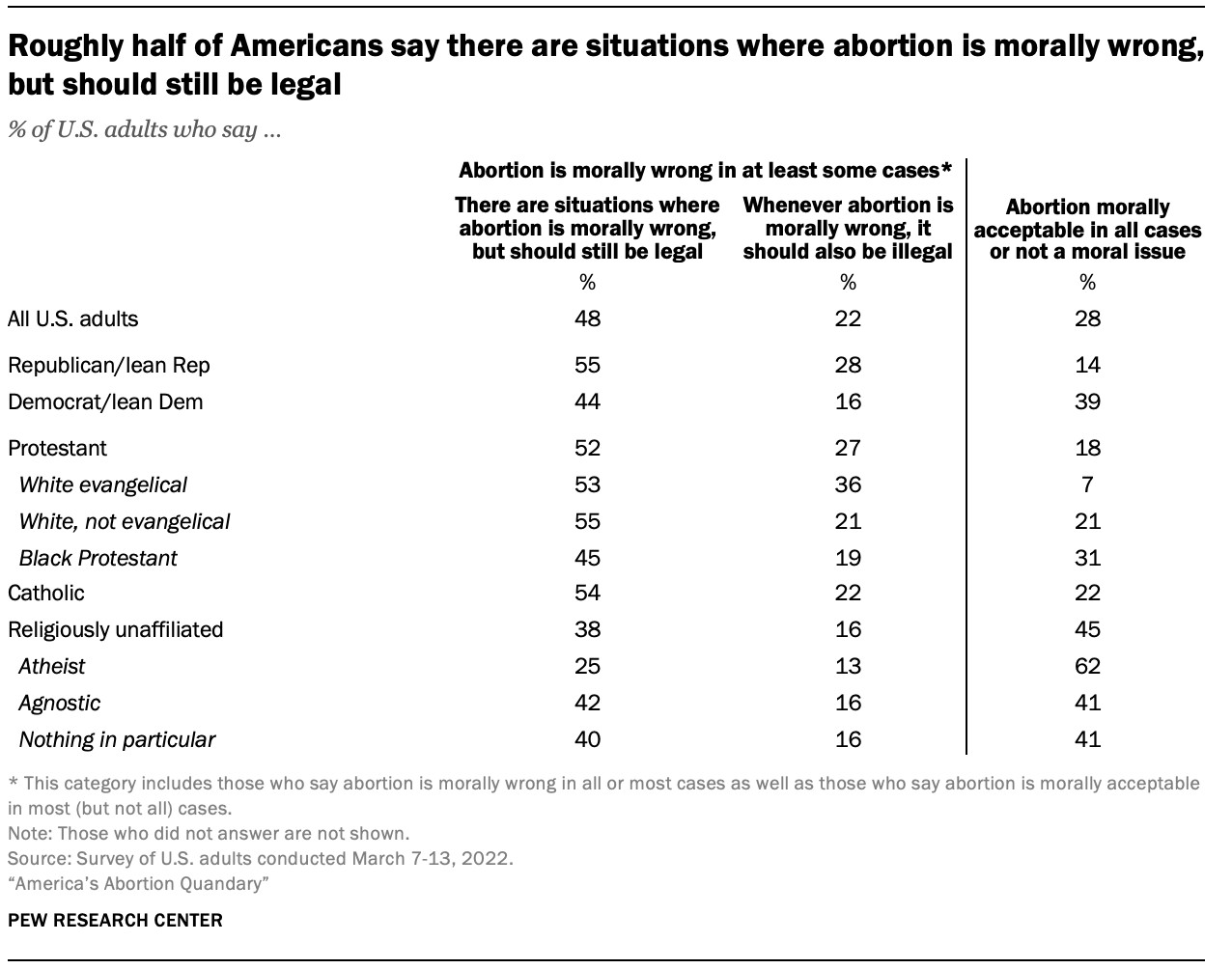
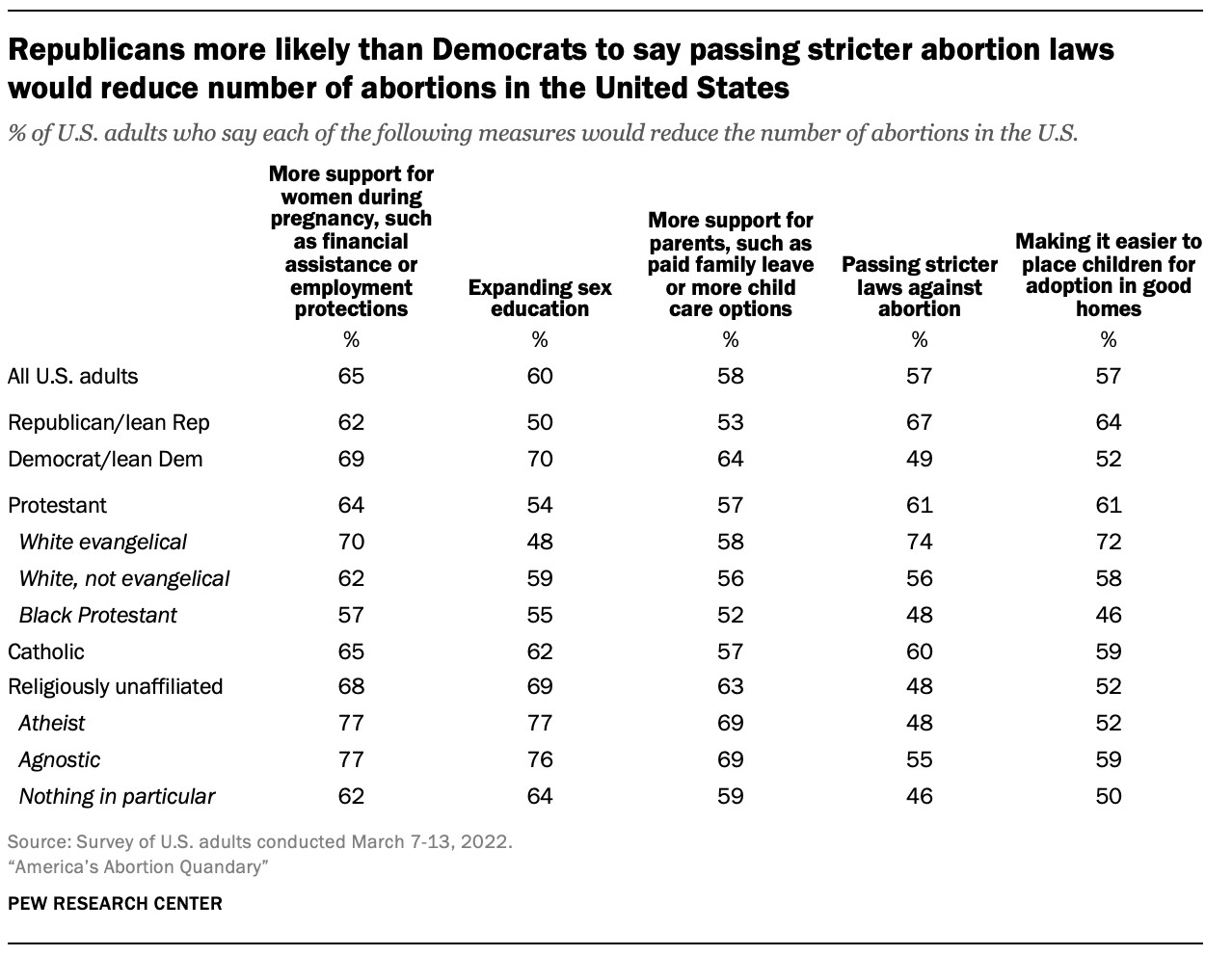
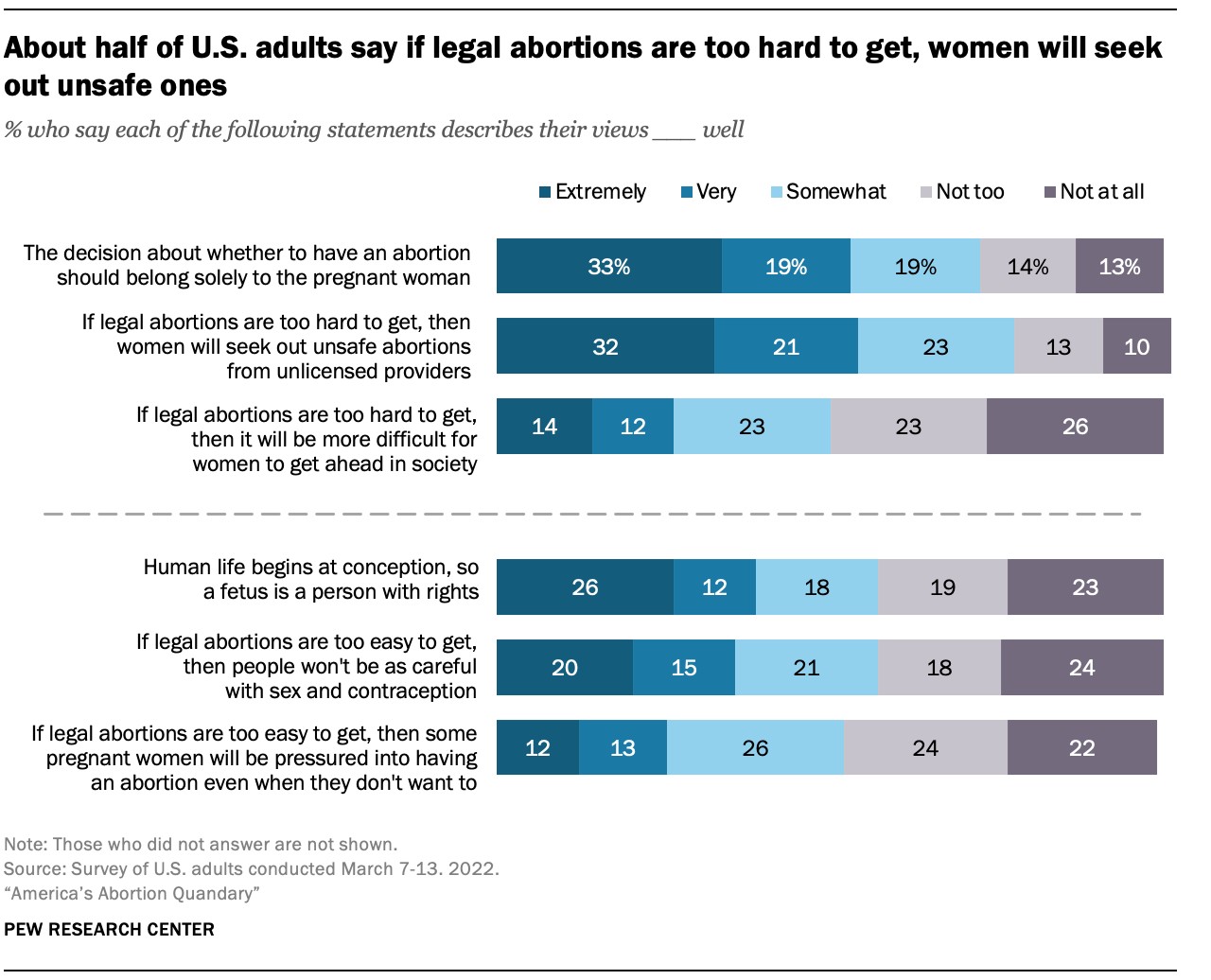
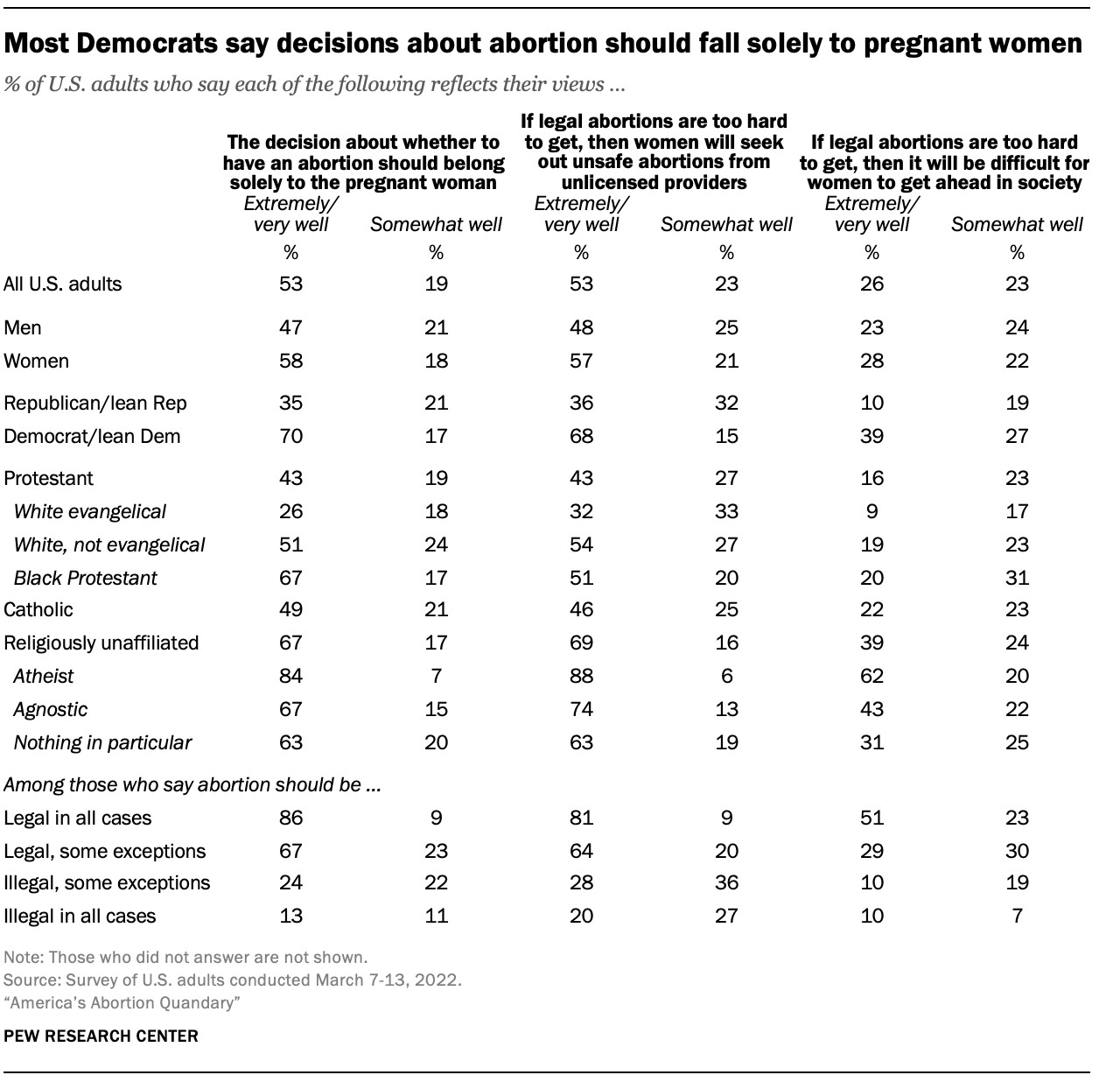
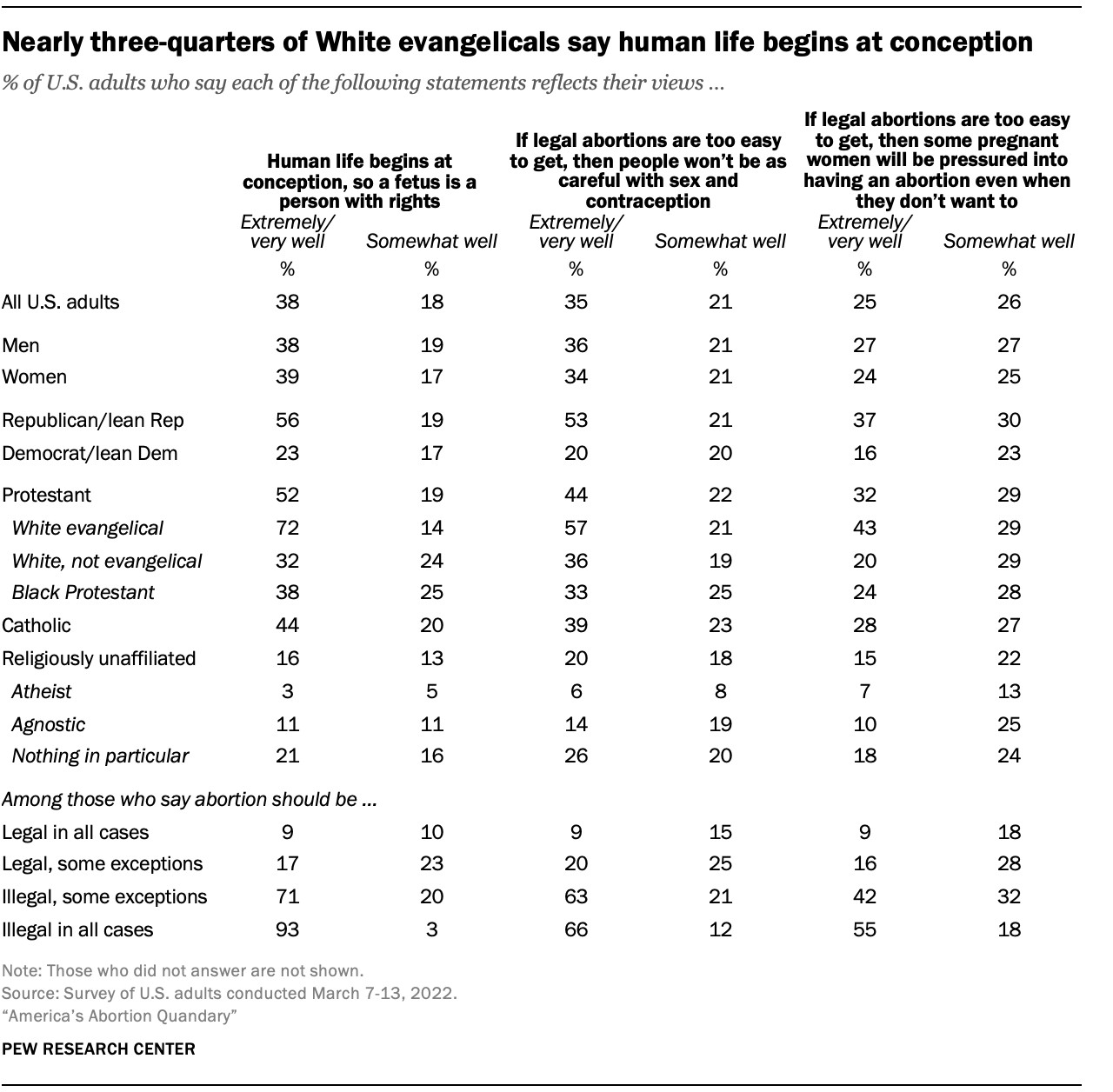
Source: Pew Research Center
- Catholic Church: The Catholic Church teaches that life begins at conception and that abortion is a grave sin, except when the mother’s life is in danger.
- Protestant Views: Protestant views on abortion are more diverse, with some denominations supporting abortion rights and others strongly opposing them.
4.2. Islamic Perspectives
Islamic perspectives on abortion are also varied, with different schools of thought holding differing views. Some Islamic scholars permit abortion in certain circumstances, such as to save the mother’s life, while others strictly prohibit it.
- Timing of Ensoulment: A key factor in Islamic views on abortion is the timing of ensoulment, the moment when the fetus is believed to receive a soul.
- Varying Interpretations: Interpretations of Islamic texts and traditions vary, leading to different conclusions about the permissibility of abortion.
4.3. Philosophical Ethics
Philosophical ethics provides frameworks for analyzing the morality of abortion based on principles such as utilitarianism, deontology, and virtue ethics.
- Utilitarianism: Utilitarianism focuses on maximizing overall happiness and minimizing suffering. From this perspective, the morality of abortion may depend on the consequences for all parties involved.
- Deontology: Deontology emphasizes moral duties and rules. Some deontological perspectives may argue that abortion is inherently wrong because it violates the duty not to kill innocent human beings.
- Virtue Ethics: Virtue ethics focuses on cultivating moral character. From this perspective, the morality of abortion may depend on whether it reflects virtues such as compassion, justice, and respect for life.
5. The Role of Law and Public Policy
The legality of abortion varies widely around the world, reflecting differing cultural, religious, and political values. Understanding the legal landscape is essential for grasping the complexities of the abortion debate.
5.1. International Laws
International laws and treaties offer varying levels of protection for abortion rights. Some international agreements recognize reproductive health as a fundamental human right, while others do not address the issue directly.
- Human Rights Treaties: Some human rights treaties recognize the right to health, which may be interpreted to include access to abortion services.
- Differing Interpretations: Differing interpretations of international laws and treaties lead to varying levels of protection for abortion rights around the world.
5.2. Abortion Laws in the United States
In the United States, abortion laws have been a subject of intense debate and legal challenges for decades. The Supreme Court’s decision in Roe v. Wade (1973) established a woman’s right to an abortion, but this right has been limited by subsequent court decisions and state laws.
- Roe v. Wade: Roe v. Wade established a woman’s right to an abortion based on the right to privacy under the Fourteenth Amendment.
- State Laws: State laws vary widely, with some states imposing significant restrictions on abortion access, such as mandatory waiting periods, parental consent laws, and limitations on abortion procedures.
5.3. The Impact of Policy Changes
Policy changes related to abortion can have significant impacts on women’s health, access to care, and reproductive autonomy.
- Access to Care: Restrictions on abortion can limit access to essential healthcare services for women, particularly those in marginalized communities.
- Public Health: Research suggests that restricting access to abortion can lead to increased rates of unintended pregnancies, unsafe abortions, and maternal mortality.
6. Examining the Mental and Emotional Aspects
The decision to have an abortion can be emotionally and psychologically challenging for many women. It is important to understand the potential mental health impacts and to provide support and resources for those who need them.
6.1. Psychological Effects
Research on the psychological effects of abortion is mixed, with some studies suggesting that abortion can lead to negative mental health outcomes, such as depression and anxiety, while others find no significant differences between women who have abortions and those who do not.
- Individual Factors: The psychological effects of abortion may depend on individual factors, such as the woman’s prior mental health, her reasons for seeking an abortion, and the level of support she receives.
- Mixed Findings: Conflicting research findings make it difficult to draw definitive conclusions about the psychological effects of abortion.
6.2. Support and Counseling
Providing support and counseling services for women considering or undergoing abortion is essential for ensuring their well-being. These services can help women explore their options, make informed decisions, and cope with any emotional challenges they may face.
- Informed Consent: Ensuring that women have access to accurate information about abortion procedures, potential risks, and alternative options is crucial for informed decision-making.
- Mental Health Support: Providing access to mental health professionals who can offer counseling and support can help women cope with the emotional aspects of abortion.
6.3. Societal Stigma
Societal stigma surrounding abortion can contribute to feelings of shame, guilt, and isolation among women who have abortions. Addressing this stigma is essential for creating a more supportive and compassionate environment.
- Open Dialogue: Encouraging open and respectful dialogue about abortion can help reduce stigma and promote understanding.
- Empathy and Compassion: Approaching the topic of abortion with empathy and compassion can create a more supportive environment for women who have abortions.
7. Analyzing Public Opinion and Ethical Trends
Public opinion on abortion is constantly evolving, reflecting changing societal values and ethical trends. Understanding these trends is crucial for informed policymaking and public discourse.
7.1. Current Public Opinion Trends
Surveys and polls provide insights into current public opinion trends on abortion. These trends can vary depending on factors such as political affiliation, religious beliefs, and demographic characteristics.
- Pew Research Center: The Pew Research Center conducts regular surveys on public opinion about abortion, providing valuable data on trends and attitudes.
- Gallup Poll: The Gallup Poll also tracks public opinion on abortion, offering insights into how views have changed over time.
7.2. Generational Differences
Generational differences play a significant role in shaping attitudes toward abortion. Younger generations tend to be more supportive of abortion rights than older generations.
- Changing Values: Changing values and beliefs among younger generations may contribute to their greater support for abortion rights.
- Social Influences: Social influences, such as exposure to diverse perspectives and experiences, may also play a role in shaping generational attitudes.
7.3. The Future of Abortion Ethics
The future of abortion ethics is likely to be shaped by ongoing debates about fetal rights, reproductive autonomy, and the role of technology in reproductive healthcare.
- Technological Advances: Advances in reproductive technology, such as non-invasive prenatal testing and artificial wombs, may raise new ethical questions about abortion.
- Evolving Norms: Evolving social norms and values are likely to continue to shape the abortion debate in the years to come.
8. Alternative Perspectives: Adoption and Support Systems
Exploring alternative perspectives, such as adoption and support systems for pregnant women and new mothers, can provide additional context for the abortion debate.
8.1. Adoption as an Alternative
Adoption is often presented as an alternative to abortion, offering a loving home for unwanted children. Understanding the adoption process and the experiences of adoptive parents and children is essential for evaluating this option.
- Adoption Agencies: Adoption agencies play a crucial role in matching adoptive parents with children in need of loving homes.
- Open Adoption: Open adoption, in which birth parents have ongoing contact with the adoptive family and child, is becoming increasingly common.
8.2. Support for Pregnant Women
Providing support for pregnant women, particularly those facing difficult circumstances, can help reduce the demand for abortion and improve outcomes for both mothers and children.
- Prenatal Care: Ensuring access to quality prenatal care is essential for the health and well-being of pregnant women and their babies.
- Financial Assistance: Providing financial assistance, such as housing support and childcare subsidies, can help pregnant women overcome economic challenges.
8.3. Postnatal Support
Postnatal support is also crucial for new mothers, helping them adjust to motherhood and providing resources for raising healthy and happy children.
- Parenting Education: Parenting education programs can help new parents develop the skills and knowledge they need to care for their children.
- Mental Health Services: Providing access to mental health services can help new mothers cope with postpartum depression and other mental health challenges.
9. The Long-Term Societal Implications
The abortion debate has far-reaching societal implications, affecting issues such as gender equality, population growth, and the overall health and well-being of communities.
9.1. Impact on Women’s Rights
Restrictions on abortion can have a disproportionate impact on women’s rights, limiting their autonomy and control over their bodies and lives.
- Gender Equality: Access to abortion is often seen as essential for gender equality, allowing women to participate fully in education, employment, and public life.
- Economic Empowerment: Restricting access to abortion can limit women’s economic opportunities, particularly for those living in poverty.
9.2. Public Health Considerations
Abortion policies can have significant public health implications, affecting rates of unintended pregnancies, unsafe abortions, and maternal mortality.
- Unsafe Abortions: Restricting access to legal abortion can lead to an increase in unsafe abortions, which can have serious health consequences for women.
- Maternal Mortality: Research suggests that countries with restrictive abortion laws tend to have higher rates of maternal mortality.
9.3. Demographic Impacts
Abortion policies can also have demographic impacts, affecting population growth, fertility rates, and the overall composition of society.
- Population Growth: Restricting access to abortion may lead to higher rates of population growth, which can have implications for resource allocation and environmental sustainability.
- Fertility Rates: Abortion policies can influence fertility rates, with more restrictive policies potentially leading to higher fertility rates.
10. Ethical Frameworks for Decision-Making
Navigating the complexities of the abortion debate requires a strong ethical framework for decision-making. Several ethical frameworks can be applied to the issue, providing different perspectives on the morality of abortion.
10.1. Rights-Based Ethics
Rights-based ethics focuses on the fundamental rights of individuals, such as the right to life, the right to bodily autonomy, and the right to make decisions about one’s own reproductive health.
- Balancing Rights: Applying rights-based ethics to the abortion debate requires balancing the rights of the pregnant woman with the potential rights of the fetus.
- Conflicting Rights: Conflicts between different rights may arise, requiring careful consideration of which rights should take precedence.
10.2. Consequentialism
Consequentialism focuses on the consequences of actions, arguing that the morality of an action depends on its overall impact.
- Weighing Consequences: Applying consequentialism to the abortion debate requires weighing the potential consequences of abortion, such as the potential loss of life, the impact on the woman’s well-being, and the societal implications.
- Maximizing Good: The goal of consequentialist decision-making is to maximize overall good and minimize harm.
10.3. Care Ethics
Care ethics emphasizes the importance of relationships, empathy, and compassion in ethical decision-making.
- Relational Context: Applying care ethics to the abortion debate requires considering the relational context of the decision, including the woman’s relationships with her partner, family, and community.
- Empathy and Compassion: Care ethics encourages empathy and compassion for all parties involved, including the pregnant woman, the fetus, and the potential parents.
11. Case Studies: Real-Life Scenarios
Examining real-life scenarios can provide valuable insights into the complexities of the abortion debate and the challenges individuals face when making decisions about abortion.
11.1. Teen Pregnancy
Teen pregnancy presents unique challenges, often involving difficult decisions about parenting, adoption, and abortion.
- Educational Impacts: Teen pregnancy can have significant impacts on educational attainment, with many teen mothers dropping out of school.
- Social Support: Social support is crucial for teen mothers, helping them navigate the challenges of parenting and complete their education.
11.2. Single Parenthood
Single parenthood can be economically and emotionally challenging, particularly for women facing financial hardship and lack of social support.
- Economic Challenges: Single mothers often face significant economic challenges, struggling to provide for their children while balancing work and family responsibilities.
- Social Isolation: Social isolation can be a significant challenge for single parents, particularly those lacking strong support networks.
11.3. Financial Hardship
Financial hardship can make it difficult for women to care for their children, leading to increased stress and potential neglect.
- Poverty and Inequality: Poverty and inequality can exacerbate the challenges faced by women considering abortion, limiting their options and increasing their vulnerability.
- Social Safety Net: A strong social safety net, including programs such as food stamps, housing assistance, and childcare subsidies, can help alleviate the financial burden on low-income families.
12. Addressing Common Misconceptions
Addressing common misconceptions about abortion is essential for promoting accurate information and fostering informed dialogue.
12.1. Abortion and Infertility
One common misconception is that abortion causes infertility. Research has shown that abortion does not typically cause infertility, although rare complications can occur.
- Medical Research: Medical research has consistently shown that abortion is not associated with an increased risk of infertility.
- Rare Complications: Rare complications, such as infection or uterine damage, can potentially affect fertility, but these are uncommon.
12.2. Abortion and Breast Cancer
Another common misconception is that abortion increases the risk of breast cancer. This claim has been widely debunked by medical research.
- Scientific Consensus: Scientific consensus is that abortion does not increase the risk of breast cancer.
- Multiple Studies: Multiple studies have found no association between abortion and breast cancer risk.
12.3. Abortion and Mental Health
As discussed earlier, the relationship between abortion and mental health is complex and not fully understood. However, it is important to dispel the misconception that abortion always leads to negative mental health outcomes.
- Individual Variation: Individual responses to abortion vary, with some women experiencing negative emotions while others do not.
- Support and Counseling: Providing support and counseling can help women cope with any emotional challenges they may face after abortion.
13. The Importance of Compassionate Dialogue
Engaging in compassionate dialogue is essential for fostering understanding and finding common ground in the abortion debate.
13.1. Respectful Communication
Respectful communication is key to productive dialogue. This involves listening to others’ perspectives, avoiding personal attacks, and focusing on the issues at hand.
- Active Listening: Active listening involves paying attention to what others are saying, asking clarifying questions, and demonstrating empathy.
- Non-Judgmental Approach: A non-judgmental approach is essential for creating a safe space for open and honest dialogue.
13.2. Finding Common Ground
Despite deep disagreements, there may be areas of common ground that can be explored. For example, both sides of the abortion debate may agree on the importance of reducing unintended pregnancies and providing support for pregnant women and new mothers.
- Shared Values: Identifying shared values can help bridge divides and foster collaboration.
- Collaborative Solutions: Working together to find collaborative solutions can lead to positive outcomes for all parties involved.
13.3. Empathy and Understanding
Empathy and understanding are essential for navigating the complexities of the abortion debate. This involves trying to see the issue from others’ perspectives and recognizing the validity of their experiences and beliefs.
- Perspective-Taking: Perspective-taking involves trying to understand how others see the world and why they hold the beliefs they do.
- Validating Experiences: Validating others’ experiences and beliefs can help build trust and rapport.
14. Resources for Further Exploration
There are many resources available for those who wish to explore the abortion debate in greater depth.
14.1. Books and Articles
Numerous books and articles have been written on the topic of abortion, offering diverse perspectives and insights.
- Academic Journals: Academic journals, such as The Journal of Medical Ethics and Bioethics, publish scholarly articles on ethical issues related to abortion.
- Non-Fiction Books: Non-fiction books, such as Abortion: A Documentary and Reference Guide by Laura K. Abortion: A Documentary and Reference Guide, provide comprehensive overviews of the abortion debate.
14.2. Websites and Organizations
Several websites and organizations provide information and resources related to abortion, including pro-choice and pro-life groups, medical associations, and government agencies.
| Organization | Website | Focus |
|---|---|---|
| Planned Parenthood | www.plannedparenthood.org | Reproductive health services, including abortion |
| National Right to Life Committee | www.nrlc.org | Opposes abortion; promotes alternatives such as adoption |
| Guttmacher Institute | www.guttmacher.org | Research and policy analysis on reproductive health issues, including abortion |
Source: Organization websites
- Planned Parenthood: Planned Parenthood provides reproductive health services, including abortion, and advocates for abortion rights.
- National Right to Life Committee: The National Right to Life Committee opposes abortion and advocates for the protection of unborn fetuses.
14.3. Educational Programs
Educational programs, such as college courses and community workshops, can provide opportunities for learning more about the abortion debate and engaging in thoughtful discussion.
- University Courses: Many universities offer courses on medical ethics, reproductive health, and women’s studies that cover the topic of abortion.
- Community Workshops: Community workshops and seminars can provide accessible learning opportunities for individuals interested in exploring the abortion debate.
15. Conclusion: The Ongoing Ethical Dialogue
The abortion debate is an ongoing ethical dialogue that requires continued reflection, discussion, and engagement. By understanding the diverse perspectives, examining the ethical frameworks, and fostering compassionate communication, we can strive to create a more just and equitable society for all. Understanding the arguments for and against abortion is crucial for any individual seeking to develop a well-informed opinion on the matter.
The question of why are abortions wrong continues to evolve with changing societal norms, scientific advancements, and ethical considerations.
WHY.EDU.VN is committed to providing comprehensive, unbiased information on complex topics like abortion, helping individuals form their own informed opinions. We understand that navigating sensitive subjects requires access to reliable resources and diverse perspectives.
Do you have further questions or need clarification on any aspect of the abortion debate? Visit WHY.EDU.VN today. Our community of experts is ready to provide the answers you seek, offering in-depth explanations and diverse viewpoints to help you understand the complexities of this critical issue.
Address: 101 Curiosity Lane, Answer Town, CA 90210, United States
WhatsApp: +1 (213) 555-0101
Website: why.edu.vn
FAQ: Frequently Asked Questions About Abortion
Here are some frequently asked questions about abortion, addressing various aspects of the issue:
- What is abortion?
Abortion is a medical procedure that terminates a pregnancy. It can be performed through medication or surgery. - When is abortion legal in the United States?
Abortion legality varies by state. Some states have more restrictions than others, but abortion is generally legal up to a certain point in pregnancy. - What are the different types of abortion procedures?
Common abortion procedures include medication abortion (using pills) and surgical abortion (such as vacuum aspiration or dilation and evacuation). - What are the potential risks of abortion?
Like any medical procedure, abortion carries some risks, including infection, bleeding, and complications from anesthesia. However, serious complications are rare. - What are the alternatives to abortion?
Alternatives to abortion include continuing the pregnancy and parenting the child, or continuing the pregnancy and placing the child for adoption. - How does abortion affect a woman’s mental health?
The impact of abortion on a woman’s mental health varies. Some women experience negative emotions, while others do not. Support and counseling can be helpful. - What is the role of religion in the abortion debate?
Religious views on abortion vary widely. Some religions oppose abortion in all cases, while others take a more nuanced approach. - How do people who oppose abortion view it?
People who oppose abortion often believe that life begins at conception and that abortion is the taking of a human life. - How do people who support abortion rights view it?
People who support abortion rights often emphasize bodily autonomy, reproductive freedom, and the importance of access to healthcare. - What are some common arguments for and against abortion restrictions?
Arguments for abortion restrictions often focus on fetal rights and the sanctity of life, while arguments against restrictions emphasize women’s rights and health.